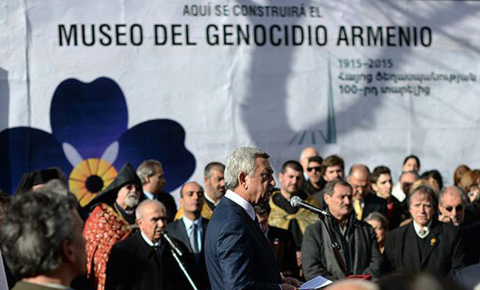Ahead of Genocide Centenary: Armenian leaders raise recognition issues during visits abroad
- (0)
\n
Ahead of Genocide Centenary: Armenian leaders raise recognition issues during visits abroad –
\n

\n
(Armenianow) – Armenian President Serzh Sargsyan, who has been on a tour of South America since late last week, visited Argentina where the main subject of his speeches and meetings was the recognition of the Armenian Genocide. Both houses of the Argentine Parliament recognized the Armenian Genocide in 1993, in different cities in Argentina there are monuments to the victims of the 1915 Genocide, and the Armenian community in this country is considered to be one of the most influential.
The Genocide subject ahead of the 100th anniversary of the tragedy becomes a major one in the rhetoric of Armenian leaders. Armenian Parliament Speaker Galust Sahakyan, who paid a visit to Moscow, invited the leaders of both houses of the Russian parliament, Valentina Matvienko and Sergei Naryshkin, to attend an international parliamentary conference in Yerevan that will be held in April 2015. The conference is part of the approved schedule of activities for the centennial of the genocide.
The visits to Yerevan by Pope Francis and French President Francois Hollande have already been unofficially announced for April 24, 1915. The arrival of other world leaders is also expected. Armenia is also preparing a legal file in connection with the Genocide, deportations of Armenians and the seizure of their property in what is now Turkey. Materials have appeared in the press challenging the legal basis of Turkey’s ownership of Western Armenia.
In particular, the Russian-Armenian newspaper, Yerkramas, published an article by the late Armenian diplomat Levon Eyramdjyants in which he gives irrefutable evidence that the 1921 Moscow Treaty was concluded only for 25 years, until 1946. It is this treaty that divided the Armenian lands between Turkey and Bolshevik Russia. In Armenia there are already articles in which authors demand the revision of the Moscow Treaty.
Still at the beginning of this year a state commission was set up in Turkey with the aim of developing measures against the recognition of the Armenian Genocide. Apparently, the Commission advised that Turkish Prime Minister Recep Tayyip Erdogan issue a message to the Armenian people on April 23, 2013. Among the steps may also be the opening of the Armenian-Turkish border as a Turkish gesture towards Armenia.
However, analysts argue that the Armenian Question was and still is part of bigger regional geopolitics and enacting it is possible within the framework of geopolitical shifts expected in the region. In particular, the probable creation of a Kurdish state, now in the territories of Iraq and Syria, may lead to the revision of the Treaty of Lausanne and the return to the Treaty of Sevres, under which Armenia was to have been united.
The fact that Armenia is making the Genocide subject “topical”, including during President Sargsyan’s latest visits, proves that Yerevan agrees to participate in these geopolitical developments that could deprive Turkey of the grounds for its territorial integrity. The replacement of the Treaty of Sevres by the Treaty of Lausanne took Armenia out of the context of the redistribution of the Ottoman Empire lands. The question is whether Armenia will again remain outside the possible changes now.
\n
Naira Haurumyan
\n



















